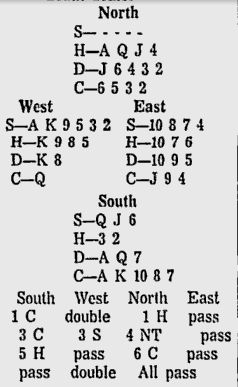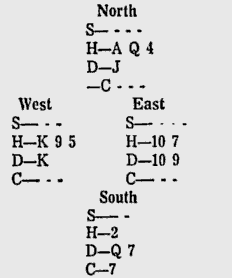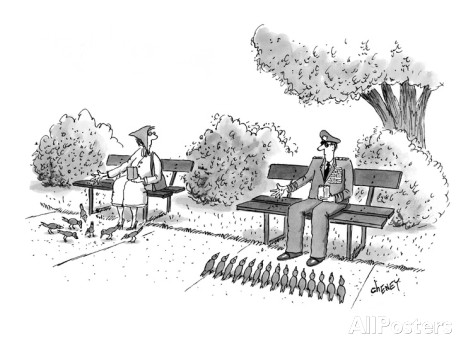Sarasota Herald-Tribune – 17 Oct 1965 by Robert Powell
Mr. Pigeon, sitting West for a change, made a takeout double of Mr. Syker’s opening bid on board seven in the special winner’s game, then sat back expectantly to hear his partner’s response . . . but Mr. Pusher stuck in his oar with a bid of one heart, and Mr. Helper passed his mess of trash. Mr. Syker showed his point count by his rebid of three clubs and Mr. Pigeon showed his glorious spade suit by the bidding of three spades. Mr. Pusher then went in to Blackwood and, when his partner showed two aces, catapulted all the way to a six-club small slam . . and Mr. Pigeon. with his three quick tricks, just couldn’t resist doubling for penalities.
Both sides Vulnerable dealer South

Lead : Spade King
Mr. Pigeon made the attacking lead of the king of spades against the doubled six-club slam, and Mr. Syker, after taking time out to ARCH the hand, called dummy’s club deuce for the ruff. He then called dummy’s club three and went up with his king to drop Mr. Pigeon’s stiff queen. He then played the spade queen from his hand for the ruffing finesse and, when Mr. Pigeon ducked by the playing of the five, called on dummy to sluff the diamond deuce.
Mr. Syker next played the spade jack, Mr. Pigeon covered with his ace, and the ruff with dummy’s club five was called. Mr. Syker next called dummy’s club six, watched Mr. Helper cover with the nine, then went in to a deep trance. Finally, he finessed his 10 spot and heaved a deep sigh of relief when it held.
He then played his ace and eight of trumps, followed by the heart three and, when Mr. Pigeon played the heart eight, Mr. Syker called dummy’s jack for the finesse. He next called dummy’s six of diamonds and, after a few moments of intense concentration, took in his closed hand with his ace. This brought about the following position:

South is on lead.
Mr. Skyer then played the seven of clubs from his closed hand and Mr. Pigeon was faced with the sickening realization that he had made a bad double . . . for no matter which card he should elect to discard it was quite apparent that Mr. Syker would make his double slam contract . . . and, worse yet, with an overtrick.
Finally, and quite reluctantly, Mr. Pigeon discarded his five of hearts. Mr. Syker called dummy’s diamond jack for the sluff, then led his heart deuce to dummy’s queen for the proven finesse. He next called dummy’s heart ace, dropping Mr. Helper’s 10-spot and Mr. Pigeon’s king, then claimed the trick with dummy’s four of hearts for six clubs vulnerable bid, doubled and made with an overtrick for a score of plus 1740. good for a top on the board.
CREDITS . . . the inspiration for today’s problem was a board from the men’s pairs at the Cleveland Nationals. This board, with 84 tables in play, was the cause of many surprising results. Several times players holding the south cards played the board at the inferior contract of three clubs making six for a very bad board. The most popular contract of all was three notrump with the player holding the south cards as the declarer. Declarers misguessing the club situation went down two tricks for a north-south tie for bottom.
Other declarers either took ten or eleven tricks, depending upon whether or not they squeezed the west defenders in the red suits. Several south players in six clubs doubled either misguessed the club situation or failed to squeeze the west players in the red suits. However, they still took twelve tricks to make their contracts for a north-south tie for top on the board. Strangely enough, no declarer ever took all thirteen tricks. Except, of course, for our fictional Mr. Syker . . . but things like that just seem to happen to Mr. Pigeon.
